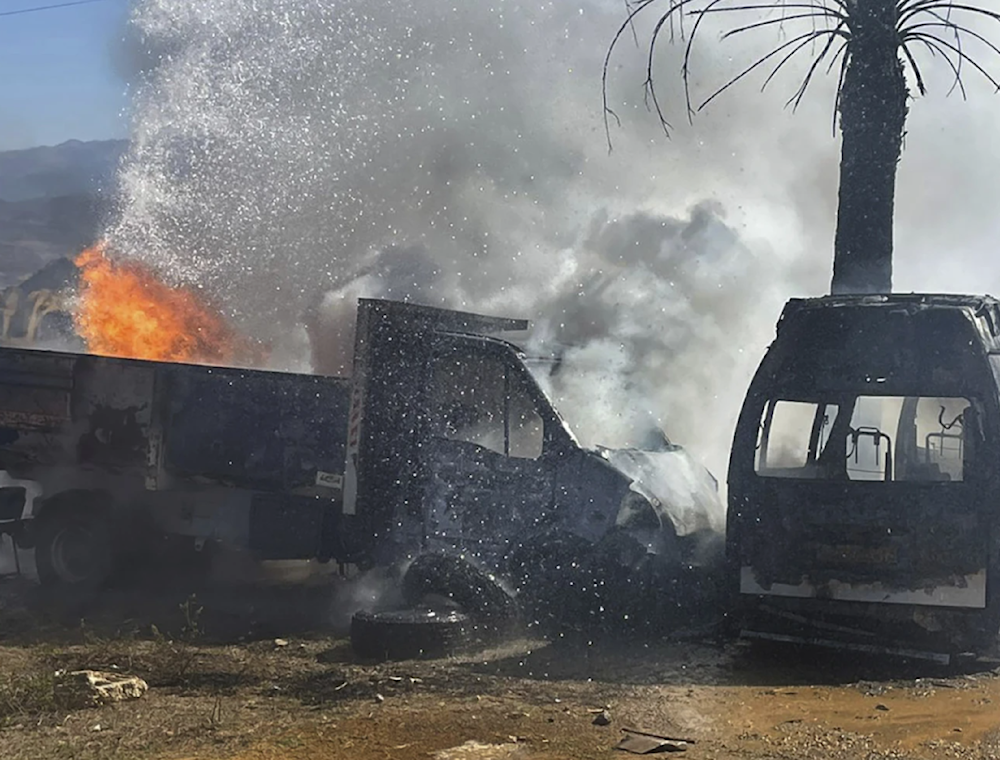Attacks on medics in Lebanon a war crime: HRW
Human Rights Watch noted that threats to instill terror among civilians violate international law, and those who choose not to flee are protected by law.
-

A truck and ambulance burn after Israeli airstrikes hit a group of paramedics outside a hospital in Marjayoun, south Lebanon, on October 4, 2024. (AP)
According to Human Rights Watch, the Israeli occupation forces (IOF) have carried out several strikes on medical workers and institutions in Lebanon, which may constitute war crimes. They detailed three particular occurrences, including an attack on a Civil Defense facility in Beirut and an ambulance strike in southern Lebanon, which claimed the lives of 14 paramedics.
As of October 25, Israeli airstrikes have killed 163 health workers in Lebanon during the previous year, causing extensive damage to ambulances and hospitals. HRW warned that these acts have a significant impact on Lebanon's already suffering health sector and limit people's access to urgent medical treatment.
Ramzy Kais, a Lebanon researcher for HRW, stated that "bombing medical personnel and facilities exacerbates the danger to wounded civilians and severely impedes their access to urgent medical care."
HRW interviewed eight Lebanese sources, including first responders, Civil Defense authorities, and hospital professionals, and went to the site of a strike on the Islamic Health Authority's Civil Defense Center, where they interviewed three residents and witnesses. HRW also examined photos, videos, and satellite images from the assaults. On October 7, Human Rights Watch addressed a letter to the Israeli military describing its findings and demanding inquiries but received no response.
On October 3, an Israeli airstrike attacked a Civil Defense station in Bachoura, Beirut, killing seven paramedics from the Islamic Health Organization. The next day, another Israeli attack targeted an ambulance near Marjayoun Hospital, killing seven additional paramedics and forcing the hospital to evacuate. The Israeli military also struck Salah Ghandour Hospital after providing an evacuation notice.
Assaults on medical centers may amount to war crimes
While the Israeli government falsely asserts that Hezbollah utilizes ambulances for military reasons, HRW found no evidence to substantiate this assertion at the destroyed institutions. They highlighted that assaults on medical institutions without a military cause are illegal and may constitute war crimes.
According to the International Committee of the Red Cross, noncombatants, even those connected with political parties such as Hezbollah, are protected by international law, and assaults on them are banned unless they do "acts harmful to the enemy."
A following strike on October 21 near Rafik Hariri University Hospital killed 18 people, including four children, emphasizing the dangers that medical personnel endure in conflict zones.
On October 25, the UN Special Coordinator for Lebanon stated that since October 2023, 27 attacks have targeted ambulances used by first responders. According to reports, Israeli attacks have intentionally targeted ambulances used by first responders, killing 28 medics in a 24-hour period on October 3.
In addition to extensive interviews, HRW examined 57 pieces of social media footage and satellite photos of impacted hospitals to illustrate the effects of the assaults. They did not go to the sites of hospital attacks in southern Lebanon but instead obtained information on the damage and injuries from other sources.
According to the organization, shortly after midnight on October 3, an Israeli airstrike hit the Islamic Health Authority's Civil Defense facility in a residential building near downtown Beirut, killing seven paramedics.
The Islamic Health Authority's spokesman, Mahmoud Karaki, revealed the paramedics were sleeping after handling martyrs and injured previous Israeli attack. The authority maintained that none of the paramedics had any military links to Hezbollah and clearly separated its humanitarian efforts and Hezbollah.
Following a subsequent incident at Marjayoun Hospital, in which additional paramedics were murdered, the hospital's director revealed that the entrance was attacked without notice, forcing the evacuation.
HRW examined evidence from the attacks, such as destroyed vehicles and blocked roadways, and concluded that the Israeli military had presented no reason for the assaults on medical institutions.
Dr. Mohammad Suleiman, director of Salah Ghandour Hospital in Bint Jbeil, stated that the hospital was bombarded on October 4, just after the Israeli military issued a warning to leave within four hours. While adjacent paramedics were evacuated, medical personnel stayed, assuming the warning did not apply to them. However, the hospital was attacked three times before the warning period finished, hurting nine staff members, three of whom were badly injured.
Other attacks include the killing of six members of the Islamic Health Organization in Sohmor, with images showing damaged ambulances but no military targets identified.
The next day, an airstrike in Kafra hit first responders during a shift change, destroying three ambulances and injuring many civilians, with videos showing wrecked vehicles at the site.
On October 9, an Israeli aircraft struck a Civil Defense facility in Dardghaya, killing five paramedics. Meis al-Jabal Hospital was evacuated on October 4 and later closed due to ongoing attacks and supply shortages, with reports of damage to the front, though it’s unclear if it was targeted after evacuation.
Human Rights Watch noted that threats to instill terror among civilians violate international law, and those who choose not to flee are protected.

 5 Min Read
5 Min Read








